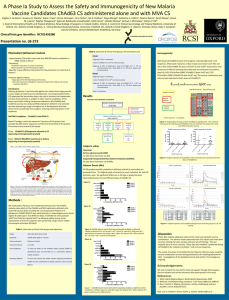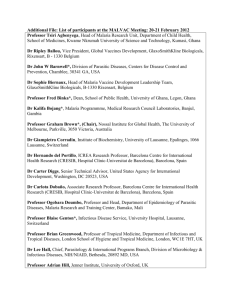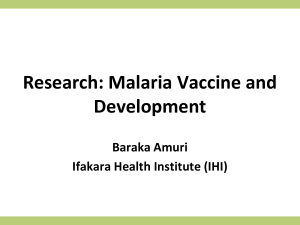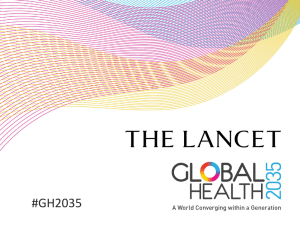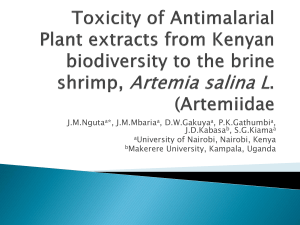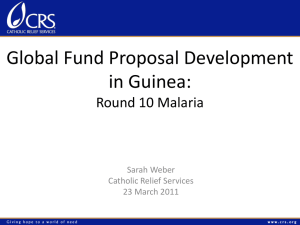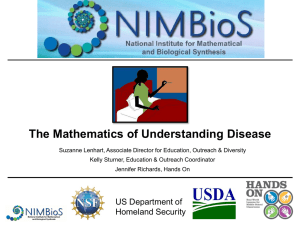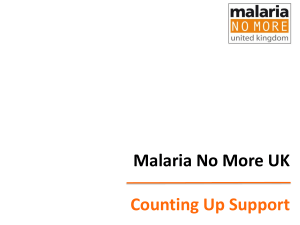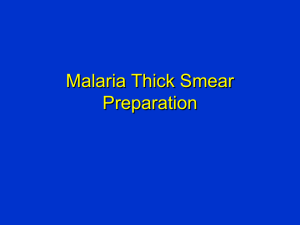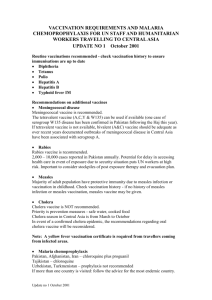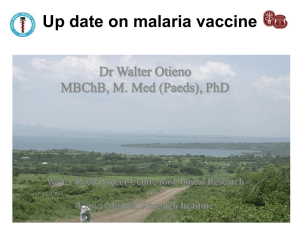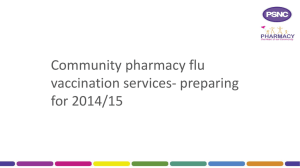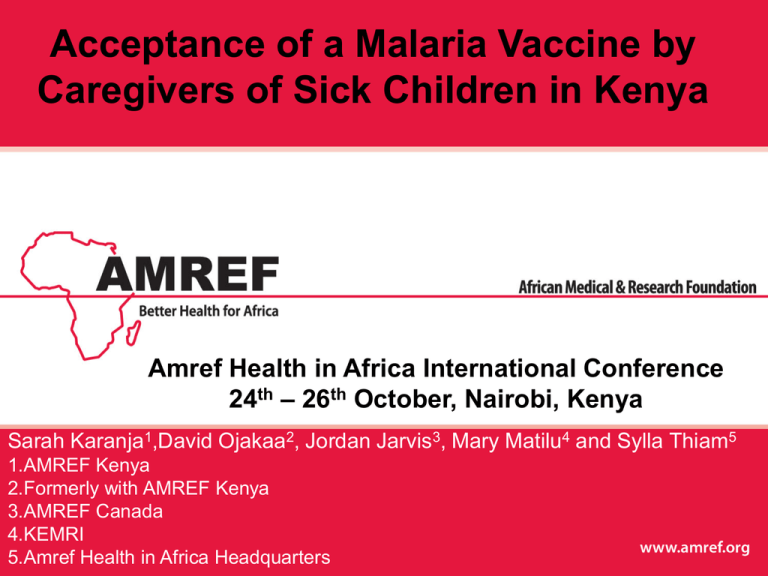
Acceptance of a Malaria Vaccine by
Caregivers of Sick Children in Kenya
Amref Health in Africa International Conference
24th – 26th October, Nairobi, Kenya
Sarah Karanja1,David Ojakaa2, Jordan Jarvis3, Mary Matilu4 and Sylla Thiam5
1.AMREF Kenya
2.Formerly with AMREF Kenya
3.AMREF Canada
4.KEMRI
5.Amref Health in Africa Headquarters
Overview of Presentation
•
•
•
•
•
•
•
Introduction
Background
Study objectives
Methods
Variables captured
Results
Conclusion and recommendations
Introduction
• Malaria a life threatening parasitic disease
• About 70% of Kenyan population at risk
(NMCP)
• Kenyan response is broad - four pronged
• Nevertheless KMIS 2010 shows gaps
persist:
– ITN coverage is one net for five people
– 25% of expectant women received IPT
at ANC
• Malaria vaccine – close gap left by these
interventions
Background
• Several malaria vaccines are currently in
clinical trials.
• GSK’s RTS,S is currently in Phase 3 clinical
development
• Consider sociocultural environment of region
for widespread approval.
• In 2010 AMREF conducted this study on
behalf of PATH Malaria Vaccine Initiative
Study Objectives
• General:
To analyse and share complimentary information
on attitudes of individuals in Kenya towards a
possible malaria vaccine
• Specific:
Determine attitudes of caregivers towards a
malaria vaccine
Identify key factors influencing attitudes of
caregivers
Methods
• Exit interviews with 2003 caregivers in 695 health
facilities across Kenya during the 2010 KSPA
• Descriptive statistics (cross-tabulation) and multinomial
regression were used to analyze the determinants of
accepting a child to be immunized with the malaria
vaccine.
List of Variables for Analysis
• Facility /Community– level factors:
– Facility type; Operating authority; Fees for services?;
Opinion on services
• Sick child – characteristics
– Type of visit; Diagnosis for malaria; Taking malaria
drug; Problems causing visit
• Caregiver – characteristics
– Opinion of services received; Relationship to the sick
child; Socio-demographic characteristics
• Malaria vaccine questions
– Whether would accept young child in community or own
child getting the malaria vaccine.
Characteristics of Caregivers
Characteristics of
respondents
Sex
Female
Male
Age
<20
20-34
35-49
50+
Relationship to child
Mother
Father
Other
Per cent
93.5
6.5
8.2
76.6
13.6
1.6
90.3
5.9
3.8
Characteristics of Sick Children
Characteristic
Sex
Female
Male
Age (years)
<1
1-2
2-3
3-4
4-5
Malaria diagnosis (clinical)
Yes
No
Malaria test (blood smear or rapid test)
Percentage
Positive
Negative
16.1
83.9
53
47
33.7
30
17.2
11.6
7.5
38.1
61.9
Acceptance of Child Vaccination
Child in
community
Own child
%
%
Yes
88.7
88.0
No
4.6
4.6
Don’t know 6.7
7.4
Caregivers educational factor and
acceptance of vaccine
Factors
Vaccination in
Vaccination of own
community
child
Yes
No
Don't Yes
No
Don't
know
know
%
Ever attended
school
Yes (85.9%)
No (14.1%)
Literacy
Read and write
(64%)
Read only (4.08%)
None (32%)
94
56
3
13
3
31
93
55
4
7
3
38
96
2
2
95
3
2
74
69
6
9
20
22
71
69
8
5
21
26
Approval of Vaccine by Region
Region
Nyanza
Coast
Eastern
Central
Western
Rift Valley
Nairobi
North Eastern
Approval of Vaccine
(%)
98.9
98.7
97.8
96.7
95.4
91
87
23
Factors associated with acceptance of malaria vaccine
Variable
RRR
P-value
Central
4.0
**
Coast
13.1
***
Eastern
8.7
***
North Eastern
0.3
*
Nyanza
12.0
***
Rift Valley
3.2
**
Western
3.7
**
0.5
**
35-49
0.3
*
50+
0.1
*
0.4
*
Region:
Satisfaction with health services:
Somewhat
Age of Caretaker:
Ever Attended school
No
*** p<0.001
**p<0.01
*p<0.05
Conclusion and recommendations
• The results show high endorsement and
expectations of the vaccine, except for North
Eastern Province.
• This calls for the need to carefully manage the
expectations as the vaccine is released
• Target specific segments of child caregivers with
relevant messages and education on the malaria
vaccine
• Target audiences include residents where
acceptance is low; older caregivers and those
with low literacy levels; service providers
Acknowledgements
• PATH MVI: for funding
• National Council for Population and
Development (NCPD) for coordination of
KSPA
• Division of Vaccines and Immunization:
Advice on priority research questions
• Division of Malaria Control: Support
• ICF Macro: Providing the datasets
• AMREF: Technical/Administrative Support
THANK YOU

